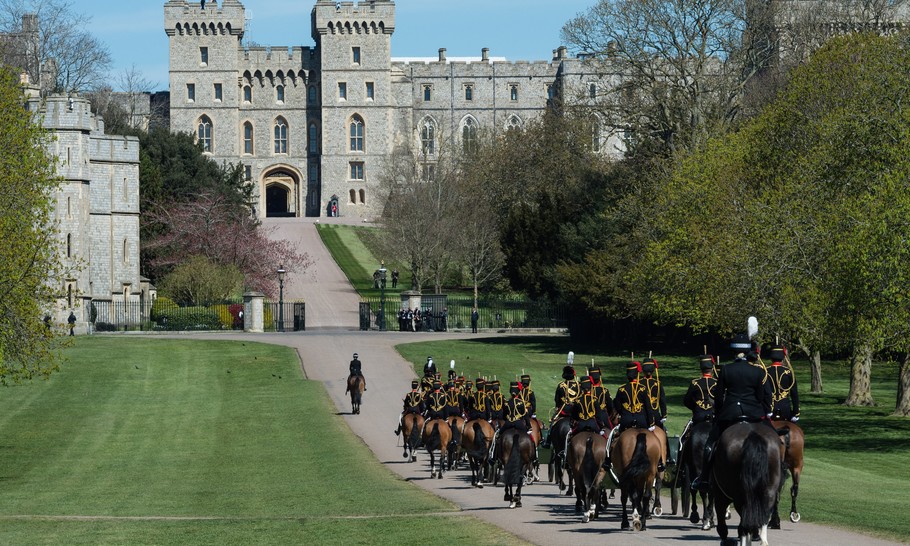Televising Philip’s funeral: last days of the ancien régime?

APRIL 17, 2021: (PA Images)
The BBC apparently received more than 100,000 complaints about their wall-to-wall coverage of Prince Philip on the day of his death. They cleared the schedules on all TV and radio channels for what some critics saw as far too deferential, a cross between the BBC in the 1950s and the Soviet Union when Brezhnev died.
Worse still, the viewing figures were terrible. According to Stephen Price in Broadcast, “BBC1 and BBC2’s shares collapsed and complaints soared, with a similar drop experienced at ITV.” Overall, total TV viewing in 6-11 pm peak-time was down 12 per cent compared with Fridays in 2021 up to 2 April. BBC1’s audience fell badly, “27 per cent in volume and 17 per cent in share for individuals; 42 per cent and 35 per cent respectively for 16-34s; and 26 per cent and 15 per cent for 55+s. ITV averaged 1.6 million/11 per cent, which also compared badly with total TV…”
But the BBC held its nerve and, last Saturday, produced superb coverage of the royal funeral. The presenters weren’t the best and this is a problem the BBC needs to sort out before the Queen’s funeral and the next election. It badly missed veterans like David Dimbleby, James Naughtie and John Humphrys.
The other problem is the interviewees: white, posh and their captions usually reading, “commentator and journalist”. What we missed were proper historians like David Cannadine, Andrew Roberts and Simon Schama, who could have put this event in some kind of context. Huw Edwards and guests gave us a lot of gush about the Queen and Prince Philip as the new Victoria and Albert, but they didn’t compare Victoria’s extraordinarily long period of mourning with the Queen’s decision to return to work within a few days.
Of course, there was a lot of pageantry and ceremonial, but how did Prince Philip’s funeral compare with that of the Queen Mother in 2002, or of George VI fifty years before? It looked remarkably similar. The British ancien régime in full military regalia, with more medals than Muttley could ever have dreamt of. There would have been even more uniforms if the Queen had not insisted that her children and grandchildren should not wear them.
It sounded familiar too. Elgar’s Nimrod, Parry’s Jerusalem and Holst’s I Vow To Thee, My Country. Elgar composed The Enigma Variations (including Nimrod) between 1898-9 and it was first performed in 1899, just before the death of Victoria. Parry composed Jerusalem in 1916 during the First World War and Holst set I Vow to Thee, My Country by Sir Cecil Spring Rice to music in 1921. These dates are no accident. This was the high point of the British Empire. In the words of Michael Ignatieff, in his biography of Isaiah Berlin, it was “the England of Kipling, King George, GK Chesterton, the gold standard, empire and victory. The long slide into imperial decline and self-doubt lay decades ahead.” Forty-four years years after Holst composed the music for I Vow To Thee, My Country, it was played at Churchill’s funeral; almost fifty years after that it was sung at Margaret Thatcher’s funeral; now, a century after Holst composed this famous patriotic hymn, it was played at Prince Philip’s funeral at Windsor Castle. These three funerals mark critical moments in the history of Englishness and Holst’s hymn is a kind of alternative national anthem.
Something else stood out. It was such a male event, made more so by the lonely presence of the Queen. Apart from Princess Anne, the coffin was accompanied by men, royalty and a specially invited guard of honour, while women looked on from the sidelines. Inside the Chapel, the service was conducted by the Dean of Windsor and the Archbishop of Canterbury, and the hymns were sung by three men and just one woman.
The significant absences were all women. No Princess Di, no Fergie and no Meghan. Of course, they have proper titles but this is what the tabloids call them and their stories are still dominated by memories of scandal and gossip. The journalists and commentators made much of how Prince Philip had reinvented the modern monarchy, but were too polite to mention what these women, their royal husbands and the tabloids did to his project since the 1980s.
Amidst respectful talk of “those in peril on the sea”, the moving sight of Prince Philip’s cap and gloves on his carriage seat, the beautiful image of the lone piper, the wreckage and gossip were never far away. There was the careful reference to “the Duke of York in a relatively rare appearance”, the attempt to read the signs between Prince William and Harry, the hushed explanation that Meghan couldn’t be there and no attempt to even mention Fergie. That’s how the tabloids have changed the modern monarchy, but Robert Hardman and Huw Edwards wouldn’t dare say it.
The BBC coverage was superb and was watched by eleven million viewers (2.1 million on ITV and less than half a million on Sky). It was packed with reverential detail: Prince Philip was the oldest knight of the garter in its history, Windsor Great Park is five thousand acres, Prince Philip’s mother was born at Windsor in 1885. The direction and camerawork were superb, helped by the glorious spring sunshine. The ancien régime – military, clerical, royal — have never looked more glorious. But who knows what havoc the tabloids, social media and Oprah will wreak on all of this in the years to come?
A Message from TheArticle
We are the only publication that’s committed to covering every angle. We have an important contribution to make, one that’s needed now more than ever, and we need your help to continue publishing throughout the pandemic. So please, make a donation.





